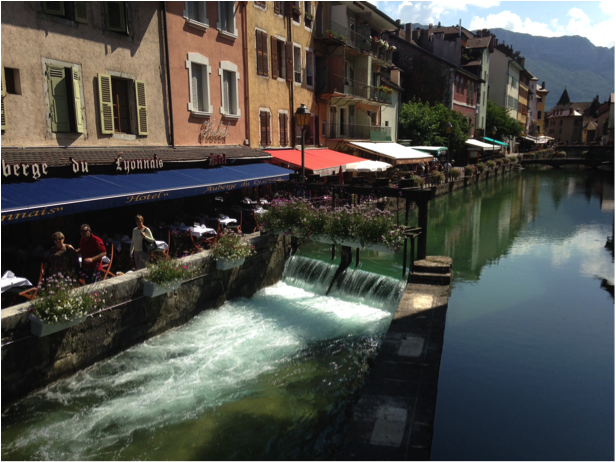CapeWomenOnline - Where Cape Women Shine
Your local venue for the women of Cape Cod to share their ideas, experiences and resources while inspiring each other in their life's journey
Inspire . Encourage . Network . Share
It's The Food, Stupid!
by Janet Eckhoff

When Mireille Guiliano published French Women Don't Get Fat: The Secret of Eating for Pleasure, she began a conversation about food, lifestyle and health that might just be worth paying attention to.
This summer, I spent two weeks in France, the land of cheese, pate, bread and croissants, and even though I partook, I lost weight. This happened when I was in France two years ago, too.
I've always been interested in food, especially over the past two years. My family is rife with diabetes and my mother had severe Alzeimer's before she passed away, two summers ago.
I have the perfect apple-shaped diabetes body, and while my doctors have indicated that I've been pre-diabetic for about ten years, I've been able to stave it off, so far.
My reading connects processed flour to stomach fat, which of course happens to most women during menopause. The book Wheat Belly was the first book I read that talked about this issue. All processed food turns into sugar faster, thus contributing to high blood sugar.
Even sugar substitutes are now thought to be at least as damaging as processed white sugar. And our flour, including the 'healthy' grainy stuff, is over 90% genetically modified. Now I am seeing articles that note a connection between diabetes and Alzeimer's.
So what does all this have to do with my eating delicious food in France?
The contrast to our rushing lives in the U.S. was evident as soon as we arrived in Mellecy. We'd met up with friends from Germany and spent the first few days touring the Burgundy area. We stayed at a B&B, which was also a wine merchant's outlet, situated in an old chalet, where our beautiful balcony overlooked sprawling, almost wild-looking gardens.
Meals, even breakfast, were often lingering, with conversations and reminiscing as we relaxed on our balcony, relishing the focus on good food and friendship.
We spent one day in the village of Beaune and another day in Lyon, where we visited the Musee Des Beaux Arts de Lyon. We shared slow, long lunches as we sat outside restaurants, soaking in the culture with our European friends.
The next week took us to a small village called Saint Joroiz, on Lake Annecy, which is surrounded by the Alps. Our vacation apartment, owned by British friends, offered a spectacular view from our bedroom.
The lake, which is about eight miles long and two miles wide, is lined with charming villages and is known as the Savoyard region.
We often began our day with croissants from the local boulangerie and Nespresso cappuccino. Then we'd take a five mile lakeside bike ride down the bike path into the town of Annecy, where the lake meets the Thiou Canal.
Annecy is an old town, with picturesque buildings housing restaurants that run alongside the canal. A farmers market is held several times a week in the streets in front of the shops, where local farmers offer fresh vegetables and fruit, sausage and a huge array of local cheeses and meats.
My family lived in Germany and Switzerland from 1997 to 2002. I still miss how the Europeans approach their food. Not just the local Savoie Fare, but how food is grown, marketed and eaten.
Tartiflette, for example, is a typical dish enjoyed in the Savoyard region. People who lived in the mountains were probably exhausted after a hard day's labor, so food needed to be filling, high in energy and readily at hand.
The menu in a restaurant in Annecy indicated that an individual serving of Tartiflette had 250 grams of cheese; about half a pound. It would be a very good choice for hikers, cliff climbers and others getting a large dose of fresh air and exercise to counteract all the cheese.
Bread purchased in the morning in France is not considered fresh enough for the evening meal, so a new loaf is purchased in the afternoon. What is not eaten is normally tossed out. Bread in the U.S. lasts for upwards of a week. Even breads that claim 'no preservatives added' already have preservatives in the flour.

While pesticides and preservatives are used in France, the French government is working towards a 50% reduction in pesticide use by 2018. Recently, a French farmer successfully sued Monsanto for pesticide poisoning and won. A pesticide marketed by Monsanto, called Alachlor, has been banned across Europe since 2007, but it is sold in the U.S.
Over 90% of the wheat, soy and corn are Genetically Modified in the U.S. Agri-Industry spokespersons shout that there is no evidence that GM food is unhealthy. My British friend, Richard, had this to say about our food industry: "It's hubris to think that there is no consequence to changing our entire food supply."
In France, livestock and chickens are not shot up with antibiotics. Most chickens are free range and actually taste like chicken. And while McDonalds is making in-roads in France, most people don't eat fast food or processed packaged foods. I don't think I ate anything pre-packaged in two weeks. There is also no snacking between meals or after supper.
Our diet in France consisted of fresh fruit salads liberally laced with fresh ginger and large green salads with light dressings that never left a pool of thick liquid in the bottom of the salad dish. We ate grilled fish and seafood, some grilled meat, and always a dessert at my friends' table.
I've read that French farmers try to select plant varieties that do well amid pressure from weeds, which helps to eliminate pesticides. In the U.S., we generally use seeds that are "Round-Up Ready." Just contemplating what that means gives me nightmares.
After two weeks in France, devouring croissants, brie, pate, baguettes and desserts, I lost 4 pounds. I would add one more reason why French Women Don't Get Fat – they eat REAL food!
Photographs published courtesy of Janet Eckhoff
Tartiflette (Serves 4 people)
Ingredients:
2 pounds of potatoes
1 whole Reblochon Cheese
Half pound of bacon
1 onion
2 pints of whipping cream
Cut potatoes into even pieces. Sweat the bacon in a large sauce pan then cover the pan. Add onions and cover. Allow onions to soften.
Add potatoes and milk then allow to simmer a few minutes until potatoes start to become tender and the sauce thickens.
Pour contents into a large au gratin dish. Cut the cheese into four pieces and place on top. Place in 180C oven. Cook for about 30 minutes, until potatoes are tender and cheese just begins to brown. Enjoy!

Janet Eckhoff became a full time resident of Cape Cod in 2010. She has spent a week in Brewster, at Ellis Landing, with girlfriends for 30 consecutive years and feels at home here.
A retired General Motors marketing executive, Janet received her Master Gardener certification in 2004. She is a member of the 'In the Weeds' gardening crew for WeCan. She also provides volunteer strategy and marketing perspective for CWO magazine.
Janet has been married for 34 years to her husband Bob, and they have one son, Tristan, who is in nursing school at Brockton Hospital in Brockton, MA.
Janet and Bob live in Yarmouthport with their calico cat named Darla.


